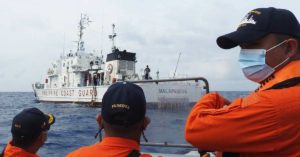AS reported by The Manila Times, the Philippines will file environmental cases against China for its allegedly destructive activities in the part of the South China Sea (SCS) that the Philippines has claimed an exclusive economic zone, particularly in the Rozul Reef and Escoda Shoal, before the Permanent Court of Arbitration (PCA).
Justice Secretary Jesus Crispin Remulla said, “We will pursue these cases against China since we already have a lot of evidence.” Remulla is in discussions with Executive Secretary Lucas Bersamin on this matter. At the same time, Solicitor General Menardo Guevarra confirmed the plan to file charges against China before the PCA.
Hindsight
Amid all possible considerations, I believe it is crucial for the current government to carefully reflect upon certain realities and exercise greater prudence before filing another lawsuit against China at the PCA. Primarily, it must weigh the potential drawbacks. Equally crucial is for the Marcos administration to assess whether the disadvantages outweigh the potential benefits of pursuing a case against China. This evaluation hinges on whether such legal action will yield tangible advantages for the nation or if it might be perceived as a propaganda maneuver aimed at shaming China, influenced by external forces challenging China’s political influence and reputation in the global stage.
There are several critical considerations that the government must carefully weigh before embarking on this path. First, it is essential to recognize that international court proceedings are intricate and protracted, and come with substantial financial costs for the Philippines. Pursuing a case in an international court demands a significant allocation of financial and human resources to cover legal fees, hire expert advisors and participate in court proceedings. This poses a notable disadvantage for a country like the Philippines which has limited resources available for committing to such intricate international legal proceedings.
Moreover, the Philippines, in comparison to China, finds itself in a less economically developed position. It’s worth noting that the nation faces an array of pressing domestic issues, encompassing financial and economic challenges such as escalating oil and gas prices, a rice crisis, rising prices of basic goods, services (i.e., electricity) and commodities, and allegations of widespread corruption. Additionally, there are pressing concerns related to maintaining peace and order, including issues like illegal drugs, local insurgence and a rising crime rate.
These multifaceted domestic challenges demand attention, resources and solutions from the administration. Instead of devoting a substantial amount of financial resources and time to another legal case against China, these financial resources and time could be redirected toward addressing pressing domestic issues, such as poverty alleviation, health care, education, infrastructure development, agricultural modernization, and others, which can impact economic development and social welfare. Nevertheless, initiating legal proceedings at the PCA against China seems to be a diversionary tactic from the pressing critical issues facing the country, which continue to await substantial solutions and sadly remain inadequately addressed.
Second, filing a case against China for the second time will only aggravate diplomatic tensions between the two countries. It will intensify the strained political and geopolitical relations between the Philippines and China. This may adversely impact trade, investment and cooperation with China, which is the Philippines’ largest trading and significant economic partner. Any disruptions in trade relations can harm Philippine exporters and industries dependent on the Chinese market. If this happens, the Philippines definitely will be in an economically disadvantageous position.
Moreover, it is worth noting that the Philippines could encounter diplomatic isolation if it fails to secure strong support from other regional or international players for its legal case against China for the second time around. This risk arises from the potential destabilization of the SCS and the broader regional security framework, an outcome that regional countries are keen to avoid in a region where collaboration is essential for addressing shared challenges, such as maritime security, cooperation and environmental concerns. A strained relationship between the Philippines and China resulting from another possible lawsuit at the PCA filed by the Philippines could be viewed by other regional countries as counterproductive. Consequently, such isolation would curtail the Philippines’ capacity to garner political backing for its cause.
Reality check dictates that when it comes to political persuasion and influence between the Philippines and China, it is evident that China will win to its side many regional countries, the Global South, the least developed countries and countries that are part of the Non-Aligned Movement. This is not only a reality but a fact.
Filipinos should note that when the arbitral ruling was released, 147 countries ignored it; seven, including Taiwan, opposed it; and 33 acknowledged the ruling but did not call for compliance. Only the Group of Seven (G7) countries led by the United States, which stand to benefit from the ruling, wanted China to comply with the award. Does this not indicate what will happen when the Philippine government files another case against China at the PCA? Are we going to embarrass and humiliate our country, once again in pushing for a round two lawsuit against China at the PCA? Have we not learned a lesson or two?
Third, even for the sake of argument, the Philippines gets a favorable judgment in this case, enforcing the judgment can be challenging, as international courts typically do not have their own enforcement mechanisms. Compliance with a judgment often depends on the willingness of the respondent country to adhere to it. This is a fact and a reality. International courts rely on the voluntary compliance of states. If a country refuses to accept the judgment or ignores it, or chooses not to participate in the legal proceedings, there may be limited recourse to compel compliance.
Just to recall, to save face because of the poor handling of the Scarborough Shoal standoff, the Noynoy Aquino administration opted for a legal approach instead of conceding to the insistence of China to resolve the conflict of interest in the Scarborough Shoal through bilateral negotiations and dialogue without the involvement of the United States or other powers not party to the dispute.
In 2013, the Aquino administration filed a case against China at the PCA, which resulted in a promising outcome in favor of the Philippines. However, China made it clear from the very beginning that it would neither accept nor participate in the arbitral proceedings because, as far as it was concerned, the contentions presented by the Philippines were not within the jurisdiction of the tribunal. Note that one of the many issues and dilemmas behind the PCA ruling is the issue of enforcement.
Conclusion
Given all these considerations, it is indeed important for the Philippines to ponder and carefully weigh these disadvantages against the potential benefits of going head-on against its neighbor, China, for the second time.
Filing another international case against China carries political and economic costs. The government must weigh the potential drawbacks vis-à-vis financial costs, diplomatic implications and other domestic priorities. Ultimately, the decision to pursue a second case against China at the PCA should be pondered carefully, considering the long-term national interest and well-being of the Philippines.
Rather than filing a case, it would be more prudent and pragmatic for the Philippines to engage China diplomatically and negotiate to seek a resolution without resorting to legal action. International litigation should be seen as a last resort when all dispute and conflict resolution avenues have been exhausted.
The Philippines and China should instead pursue maritime cooperation, a critical and multifaceted aspect of international relations that encompasses collaboration, coordination and partnership among countries in the domain of oceans and seas. Maritime cooperation between the two countries could play a pivotal role in addressing their conflicting interests and differences over the contested waters of the SCS, and it may offer greater opportunities from which both sides could benefit.
Source: The Manila Times
https://www.manilatimes.net/2023/09/23/opinion/columns/the-soundness-of-filing-a-second-case-vs-china-at-pca/1911318


